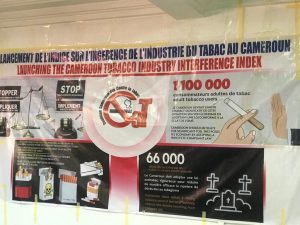Story, Louvier Kindo Tombe

The government of Cameroon is committed to control the tobacco sector by implementing the regulations on graphic health labels. This is in line with the Framework Convention on Tobacco Control (FCTC) that the country has signed. The regulation is not good news to tobacco industries which will stop at nothing to neutralize efforts from whosoever, that can affect their profit.
According to the tobacco industry interference index 2023, tobacco industries greatly influenced government’s control measures. The report was officially launched and presented to the public by the Cameroon Coalition to Counter Tobacco (C3T). It was during a press conference in Yaounde on November 16, 2023.

The Cameroon Coalition to Counter Tobacco (C3T ) is a non-profit organization with a socio-humanitarian vocation. It is made up of a network of Cameroonian civil society organisations working for a Cameroon free of tobacco-related illnesses and deaths.
During the press conference, the Communication Officer of C3T, Prince Mpondo revealed that it is the first time for Cameroon to be considered in the global tobacco industry interference index, and the outcome was very poor. The country recorded a score of 81/100, occupying the 18th position out of 18 African countries and the 84th position out of 90 countries evaluated this year worldwide.
From the results, it is evident that tobacco industries are manoeuvring to hinder government’s control of the tobacco sector. Out of the 7 points considered, Cameroon occupied the last positions in each of the points.
The interference

The framework convention for tobacco control prohibits tobacco industries from interfering in policy development by governments. But the report presented to the press shows that tobacco industries were present and contributed financially and technically in the elaboration of standards for nicotine products at the level of the Agency for Standards and Quality (ANOR). The findings show that “ANOR’s TC 47 committee on tobacco issues is chaired by a tobacco industry representative, and the background material for the draft standards reviewed by the committee members was proposed still by a tobacco industry representative”. Consequently, the text arrived at was contrary to the provisions of the Framework Convention on Tobacco Control. It was thus rejected and since then, Cameroon is yet to adopt the text of application of the 2006 law governing advertising in Cameroon – 17 years now.
The government of Cameroon is equally faulted to have received huge financial assistance from a tobacco industry during the COVID 19 period as part of the fight against the pandemic. This according to the FCTC is abnormal. C3T believe that such collaboration is affecting the implementation of the convention. A clear example is with the graphic health warning regulation, where the Minister of Public Health is yet to sign the second set of graphic images, close to three years after the first ones expired but are still in use.
All these according to the report promotes conflict of interest, lack of transparency in operations, unnecessary interaction, and makes preventive measures lacking in the country.
The way forward

The Cameroon Coalition to Counter Tobacco did not only present the findings of the global tobacco industry interference index in Cameroon, but made some recommendations to salvage the situation.
Amongst the recommendations is the need to stop tobacco industries from providing support to the government through their corporate social responsibilities, to adopt an anti-tobacco law and texts of applications, to stop the retailing of tobacco products to minors and by sticks of cigarettes, and most especially for the government to maintain a firm position against the interference of tobacco industries.








